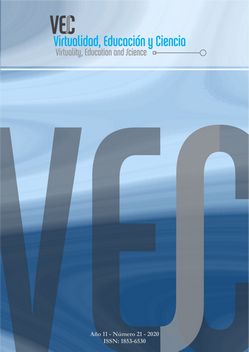Successful experiences of mobile learning in formative processes
DOI:
https://doi.org/10.60020/1853-6530.v11.n21.29438Keywords:
education; ICT; integration; learning; mobileAbstract
The integration of mobile telephony in different social fields and the way it has been incorporated into people's daily lives have promoted a scenario of new perspectives to face the impacts on educational processes. This article as a result of the process of exploring successful experiences of integrating ICTs in education, specifically with mobile learning, as a strategy to face educational challenges as desertion, literacy, coverage and costs, overall in the context of rurality and vulnerable and marginalized populations. The use of mobile learning passed in a way to close the digital gap in the school field, to a way to mitigate some social inequalities, that is, contribute to closing the social and pedagogical gap, especially in developing countries. Such situation faces great challenges, summed up in the construction and adoption of bold and flexible public policies.
Downloads
References
BURTON, S. & PÉREZ-GORE, I. (2014). English in Action (EIA) programme, Bangladesh: teaching and learning English – teachers’ and students’ perceptions. UNESCO. Recuperado de: http://oro.open.ac.uk/40759/
CRISTANO, Y. (2013). Text2Teach: What we've learned from a decade of mobile learning in primary schools in the Philippines, UNESCO. Recuperado de: http://www.unesco.org/new/en/unesco/themes/icts/m4ed/unesco-mobile-learning-week-2014/symposium/breakout-sessions/text2teach/
ESTRADA, E. (2014). Experiencias De Aprendizaje Móvil En El Mundo. Recuperado de: http://virtualpostgrados.unisabana.edu.co/pluginfile.php/426138/mod_resource/content/2/Cap%C3%ADtulo%202.pdf
FERNANDES, A., ABELLO, A. & KELLY, G. (2019). Empowering students to become agents of social transformation through mobile learning in Brazil. Case study by the UNESCO-Fazheng project on best practices in mobile learning. Recuperado de: https://unesdoc.unesco.org/ark:/48223/pf0000366724?posInSet=1&queryId=8d3ea270-84f8-4c01-bbd4-d8f4f1cda8c4
FORN, A., CASTRO, J., & CAMACHO, M. (2019). mSchools: Transforming the education landscape in Catalonia (Spain) through a systemic and inclusive mobile learning programme. Case study by the UNESCO-Fazheng project on best practices in mobile learning. Recuperado de: https://unesdoc.unesco.org/ark:/48223/pf0000366726?posInSet=1&queryId=9691d4b4-b9f6-4fe8-8084-82d206a30a04
FUNDACIÓN TELEFÓNICA, GUÍA MOBILE LEARNING (2014). Recuperado de: https://observatorio.profuturo.education/wp-content/uploads/2016/04/Guia_MobLearning.pdf
HINESTROZA, J. E. (2018). Mobile Learning as a long-term institutional innovation strategy in Spain. Case study by the UNESCO-Fazheng project on best practices in mobile learning. Recuperado de: https://unesdoc.unesco.org/ark:/48223/pf0000366323?posInSet=1&queryId=23a5e237-8e90-43e1-929d-500973ba5cea
JARA, I., CLARO, M. Y MARTINIC, R. (2012). Aprendizaje Móvil Para Docentes En América Latina. Análisis del potencial de las tecnologías móviles para apoyar a los docentes y mejorar sus prácticas. UNESCO. Recuperado de: https://unesdoc.unesco.org/ark:/48223/pf0000216081_spa?posInSet=6&queryId=45d4ab8f-0dda-4e80-8a48-37045b4595aa
LIM, C. & KYE, B. (2019). Classroom revolution through SMART education in the Republic of Korea. Case study by the UNESCO-Fazheng project on best practices in mobile learning. Recuperado de: https://unesdoc.unesco.org/ark:/48223/pf0000366729?posInSet=1&queryId=98f3a4ed-3159-4f80-b6f8-995af7f5b9a6
LUGO, M. T., Y SCHURMANN, S. (2012). Activando el aprendizaje móvil en América Latina, UNESCO, 1(1), 9-46. Recuperado de: https://unesdoc.unesco.org/ark:/48223/pf0000216080_spa?posInSet=1&queryId=7222cd94-bbb0-4b01-882e-166f455e57e4
LUGO, M. T., RUIZ, V. (coord.) (2016). Revisión comparativa de iniciativas nacionales de aprendizaje móvil en América Latina. Los casos de Colombia, Costa Rica, Perú y Uruguay, UNESCO, 2016. Recuperado de: https://unesdoc.unesco.org/ark:/48223/pf0000243976?posInSet=1&queryId=783f6518-d936-4e4a-bf0f-b4f9538b5659
NOKIA, MOBILE LEARNING FOR MATHEMATICS. Recuperado de: http://www.comminit.com/content/nokia-mobile-learning-mathematics
SHAFIKA ISAACS, S. (2012). TURNING ON MOBILE LEARNING IN AFRICA and the MIDDLE EAST. Illustrative Initiatives and Policy Implications, UNESCO. Recuperado de: https://unesdoc.unesco.org/ark:/48223/pf0000216359?posInSet=1&queryId=7181e001-4c82-4218-aa52-6541d014beb7
SHARPLES, M., TAYLOR, J. y VAVOULA, G. (2006) A Theory of Learning for the Mobile Age. The Sage Handbook of Elearning Research, Sage publications.
SHUTONG, Y. & EMERSON, L. (2019). Mobile learning as a catalyst to global citizenship education in China. Case study by the UNESCO-Fazheng project on best practices in mobile learning. Recuperado de: https://unesdoc.unesco.org/ark:/48223/pf0000366725?posInSet=1&queryId=6d363f20-5e2f-4f43-ae8f-2b6bd7292b04
UNESCO (2007). ICT Lessons Learned Series Volume III. Initiating and Managing SchoolNets: Lessons Learned. Recuperado de: https://unesdoc.unesco.org/ark:/48223/pf0000152161?posInSet=1&queryId=6e10b17b-4f53-48be-a897-4088963f490b
UNESCO (2014). Aprovechar el potencial de las TIC para la Alfabetización. Recuperado de: https://unesdoc.unesco.org/ark:/48223/pf0000245201?posInSet=1&queryId=3a1a72e2-5635-4488-8aec-daedb54dc69b
VOSLOO, S. (2013). Aprendizaje Móvil y Políticas. Cuestiones Claves UNESCO. Recuperado de: https://unesdoc.unesco.org/search/a82f41a9-01ed-4693-a61b-447e7c9350a2
WEST, M. (2012). Activando el Aprendizaje Móvil: Temas Globales. UNESCO. Recuperado de: https://unesdoc.unesco.org/ark:/48223/pf0000216451_spa?posInSet=1&queryId=d60bb333-ab1b-493d-b471-0b3e00b48382
Published
How to Cite
Issue
Section
License
Copyright (c) 2020 Virtuality, Education and Science

This work is licensed under a Creative Commons Attribution-NonCommercial 4.0 International License.
The generation of derivative works is allowed as long as it is not done for commercial purposes. The original work may not be used for commercial purposes.


